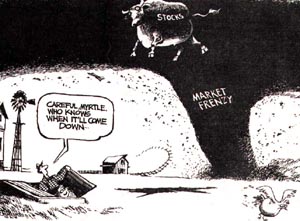|
|

Jewish World Review / May 8, 1998 / 12 Iyar, 5758
William Pfaff
PARIS -- A friend said to me the other day that the word
"crash" no longer is part of the American vocabulary. We
only know stock market "correction," and corrections have
just to be waited out.
He explained to me that the stock market only goes up,
because immense popular and political interests, as well as
corporate interests, are today committed to its only going up.
His implied argument was that the American government has
no choice but to make it go up.
It struck me, as he was speaking, that this might have been
what Jay Gatsby was saying to his friends during the luxurious
summer of 1929, a few months before Gatsby disappeared
off the end of that dock in West Egg, on Long Island Sound, or
went back to the Middle West -- if it was the Middle West --
which, for Gatsby, would have been worse. But I am a child
of the Depression.
It also struck me that this belief that Washington has the
power to make the market perpetually go up contradicts
what everyone in the markets has been saying during the last
few years, which is that in the age of globalization and
liberalization, governments are no longer relevant; they
should get out of the way of the market.
We have recently seen crashes in the Asian markets. Most
Americans, including President Bill Clinton, seem confident
that the United States will not suffer from what happened in
Asia. The general belief is my friend's belief, that the
American economy now has been transformed into one
which can only grow.
This seems to me a very romantic view of globalized
American capitalism, which by objective measurement has
not proven notably more efficient (nor even more globalized)
than the post-World War II economy. The level of
international exchanges is little larger today than it was at the
end of the 19th century, when the industrial countries
functioned on the gold standard -- their version of a single
currency.
Since the end of fixed exchange rates in 1971, the major
industrial economies have mostly seen lower growth, higher
unemployment, and lower productivity growth than before.
They experienced a sharp deterioration in overall
performance in the 1980s and early 1990s, as John Eatwell,
president of Queens' College, Cambridge notes in a new
Swedish Foreign Ministry assessment of globalization. Growth
of GNP in the major industrial countries during the
1983-1992 period was about half that of 1964-1973. Growth
of GNP per capita during both periods was lower than in the
immediate postwar period in 18 out of the 20 OECD
countries.
It is true, as President Clinton recently said, that "over any
given 15- or 20-year period, the stock market has always
outperformed...government bonds." One reason this is true is
that world war and cold war drove the economy. As recently
as the Reagan administration, the U.S. gave itself a solid
stimulus of Keynesian deficit spending. Britain, the other
leading free-market economy, enjoyed a bracing devaluation
in 1992 (the effects of which now are wearing off).
The other reason Mr. Clinton is right about the stock market
is that you knowingly accept a fixed return from bonds
because your money is safe. Stocks may outperform bonds on
the way up, but stocks can also ruin you by going down. It's all
in the timing.
The United States has been the principal beneficiary of
globalization. The largest net international transfer of
resources between 1983 and 1992 was to the United States,
at an average rate of $100 billion per year. After 1992 there
were big net transfers of both portfolio and direct investment
to Asia and to Mexico as a result of market liberalization
there, leading up to financial crisis in both places.
The fact that the American investors escaped major losses in
those crises, thanks largely to American-promoted IMF
rescues, has added to Americans' sense of invulnerability in
the new economy. This undoubtedly is influenced by the
parallel American sense of political and military
invulnerability. The same friend said to me, "Do you think
any other empire has ever been so powerful?"
I said that in sheer physical power, the answer obviously is no.
But Greece, Rome, the great Arab empire of the 8th to 12th
centuries, Spain and Portugal, Britain, France --- all left more
profound and even positive cultural marks on the foreign
societies they dominated than the United States has done.
America's global hegemony is only a few years old, and the
sustained American world engagement goes back only to
1941. We will see what comes next. It is not unreasonable to
argue that we today experience the peak of America's
influence. But even if that is wrong, I cannot believe that the
American market can only go up, which would mean that we
have found the alchemists' stone --- an unlikely story, as Jay
Gatsby himself would have acknowledged.
I would stick with an older American assumption, that if
something seems too good to be true, it probably
 Things can only get better and better!
Things can only get better and better!

5/5/98:
Racial, ethnic, national barriers disappearing
4/21/98: A terrifying synthesis of forces spawned Pol Pot's regime
4/19/98: Russian-German-French structure of consultation is good development
4/16/98: Violence in society comes from the top as well as the bottom
4/13/98: Clinton's foreign policy does have a sunny side, too
4/8/98: Public interest must control marketplace
4/5/98: Great crimes don't require great villians
3/29/98: Authority rests on a moral position, and requires consent
3/29/98:Signs of hope in troubled Russia
3/25/98: National Front amassing power
3/23/98: NATO's expansion contradicts other American policies
3/18/98: The New Yorker sought money, but lost it
3/16/98: America's 'strategy of tension' in Italy
3/13/98: Slobodan Milosevic may have started something that can't be stopped